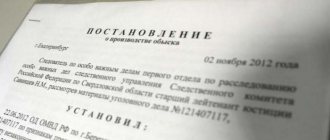New edition of Art. 447 Code of Criminal Procedure of the Russian Federation
1. The requirements of this chapter are applied in criminal proceedings in relation to:
1) a member of the Federation Council and a deputy of the State Duma, a deputy of the legislative (representative) body of state power of a constituent entity of the Russian Federation, a deputy, a member of an elected local government body, an elected official of a local government body;
2) a judge of the Constitutional Court of the Russian Federation, a judge of a federal court of general jurisdiction or a federal arbitration court, a magistrate and a judge of a constitutional (charter) court of a constituent entity of the Russian Federation, a juror or an arbitration assessor during the period of his administration of justice;
3) the Chairman of the Accounts Chamber of the Russian Federation, his deputy and auditors of the Accounts Chamber of the Russian Federation;
4) Commissioner for Human Rights in the Russian Federation;
5) the President of the Russian Federation who has ceased to exercise his powers, as well as a candidate for President of the Russian Federation;
6) prosecutor;
6.1) Chairman of the Investigative Committee of the Russian Federation;
6.2) the head of the investigative body;
7) investigator;
lawyer;
9) a member of the election commission, referendum commission with the right of decisive vote;
10) a registered candidate for deputy of the State Duma, a registered candidate for deputy of a legislative (representative) body of state power of a constituent entity of the Russian Federation.
2. The procedure for criminal proceedings against persons specified in part one of this article is established by this Code with the exceptions provided for by this chapter.
What is Article 447 of the Code of Criminal Procedure of the Russian Federation about?
Art. 447 of the Code of Criminal Procedure contains the following information:
- a list of persons in relation to whom a special procedure for conducting criminal cases is applicable;
- the procedure for conducting cases in relation to persons from the specified list, using the provisions of Chapter 52 of this code.
The special subjects listed in Article 447 are obliged to answer equally with everyone else for the unlawful acts they have committed. When conducting a criminal case against them, all procedural actions established by this code are carried out, but at the same time the process of their implementation is significantly complicated for various reasons.
Basic provisions
Art. 447 of the Code of Criminal Procedure must be considered in the context of the entire 52 chapter. The first thing that is listed in it is special subjects under the Code of Criminal Procedure of the Russian Federation.
These include:
- members of the Federation Council of the Russian Federation;
- deputies of the State Duma of the Russian Federation;
- deputies of the legislative assembly of a constituent entity of the Russian Federation;
- deputies of self-government bodies;
- judges;
- jurors and arbitration assessors during the performance of their procedural duties;
- Chairman of the Russian Federation SP;
- Deputy Chairman of the Russian Federation SP;
- auditors of SP RF;
- Ombudsman of the Russian Federation;
- The President of the Russian Federation, who resigned;
- candidates for president of the Russian Federation;
- prosecutors;
- Chairman of the Investigative Committee;
- heads of investigation;
- investigators;
- lawyers;
- members of the election commission;
- candidates for deputies of the State Duma and the legislative assembly of the subject.
The procedure for conducting criminal cases against special subjects is established by the code, taking into account compliance with the norms established in Chapter 52 of the Code of Criminal Procedure.
When are the provisions of Section 447 of the Code of Criminal Procedure applicable?
It is obvious that the provisions of Article 447 of the Code of Criminal Procedure, as well as the entire 52 chapter of this Code, are applicable when special. subjects commit illegal criminal acts. The need to allocate a number of officials to a separate legal caste is due to modern realities. Specialist. subjects must be reliably protected from provocations from ill-wishers, because the lives of other people largely depend on them.
Consideration of a criminal case in court according to a special procedure
Unfortunately, the good intentions of the legislator, who protected high-ranking officials and people called upon to temporarily decide their destinies from various kinds of attacks, do not always benefit the population of the country and the state as a whole. Some special subjects use immunity as a cover to commit illegal acts.
Comments on the article
In order to accurately understand the essence of the part of the criminal procedure law under consideration, you need to study Article 447 of the Code of Criminal Procedure of the Russian Federation with comments. The most important commentary to the article in question states that the provisions of the entire 52 chapter of this Code are an example of differentiation of criminal procedural law towards more complexity.
One of the definitions of the Constitutional Court of the Russian Federation contains a legal position, the main idea of which is the fact of confirmation that it is much more difficult to initiate and conduct criminal cases against the persons listed in Article 447. It is important to understand that by providing special subjects are provided with additional procedural guarantees; the legislator does not exclude the possibility of bringing them to justice.
To determine the status of the persons listed in the commented article, you need to refer to the relevant regulations. It is important to take into account that the laws of the Russian Federation do not always contain an unambiguous definition of certain categories of persons. In order to avoid procedural errors in the conduct of a criminal case, it is also necessary to study the special laws that regulate the professional activities of such persons. They pay special attention to the signs of status from the point of view of law inherent in a specific position from the specified list.
The definitions of persons from the list of Article 447 of the Code of Criminal Procedure are as follows:
- a member of the Federation Council is a representative of a constituent entity of the Russian Federation who is authorized by the relevant Federal Law to exercise legislative and other powers;
- a State Duma deputy is a representative of the people elected in accordance with the Federal Law “On Elections to the State Duma”, who is authorized to exercise legislative and other powers;
- a deputy of the legislative assembly of a constituent entity of the Russian Federation is a person elected by the residents of the region through the exercise of direct suffrage;
- a deputy is a person who is elected by voters of a particular district to a government body or municipal entity through the exercise of the right to vote;
- a member of an elected body of self-government is a person who is part of a municipality that was formed at municipal elections;
- an elected official of a self-government body is a citizen of the Russian Federation chosen by secret ballot to work in a specified place;
- a judge is a person empowered to administer justice;
- a juror is a civilian summoned to participate in court proceedings in accordance with the provisions of the Code of Criminal Procedure;
- arbitration assessor is a person vested with powers giving the right to administer justice;
- Chairman of the joint venture is an official appointed to the position by the State Duma by resolution of the President of the Russian Federation;
- deputy chairman of the joint venture is an official who performs the duties prescribed in the Regulations of the joint venture of the Russian Federation, appointed by the State Duma on behalf of the President;
- the auditor of the SP of the Russian Federation is an official who heads the activities of the Accounts Chamber;
Responsibilities and powers of the investigator in criminal proceedings according to the Code of Criminal Procedure of the Russian Federation, Article 38
- An ombudsman is a citizen of the Russian Federation appointed by the State Duma to monitor compliance with human rights in the country;
- The President of the Russian Federation who has ceased to exercise his duties is the former head of state;
- a presidential candidate is a person who has nominated himself for the position of head of state;
- prosecutor - an official acting within the limits of his competence in accordance with the Federal Law “On the Prosecutor's Office of the Russian Federation”;
- the chairman of the RF IC is the head of the IC who is responsible for the committee’s performance of various tasks;
- head of the investigation - the official heading the investigative unit;
- investigator - an official who has the right to carry out investigations in criminal cases;
- A lawyer is a person who has the right to practice law on the basis of Federal Law No. 63.
In relation to persons not included in the list of Art. 447 of the Code of Criminal Procedure, the general rules of production are applicable.
Privileges and immunities in relation to a lawyer in criminal proceedings
Trunov I.L., vice-president of the Federal Union of Lawyers, Doctor of Law, professor, academician of the Russian Academy of Natural Sciences. Trunova L.K., Doctor of Law, Professor of the Moscow Institute of Institution, Corresponding Member of the Russian Academy of Natural Sciences, Honorary Lawyer of Russia, Deputy Chairman of the Moscow “On Advocacy and Advocacy in the Russian Federation” <*>. Granting a lawyer procedural immunity is an additional guarantee of the protection of the rights and legitimate interests of citizens when a lawyer carries out his professional activities. A lawyer is the only independent subject of providing qualified legal assistance, protected by legal immunity, attorney-client privilege, and guarantees of non-interference in professional activities. ——————————— <*> See: Rossiyskaya Gazeta. 2002. June 5. The term “immunities” in its commonly used sense is usually disclosed with the help of such closely related synonyms as “special rights”, “privileges”, “benefits”, “advantages”, etc. In turn, in encyclopedic dictionaries and dictionaries of the modern Russian literary language, the listed names of this concept are given definitions containing its essential features <*>. ——————————— <*> See: Soviet Encyclopedic Dictionary. Ed. 4th, rev. and additional M.: Soviet Encyclopedia, 1989. P. 490, 742, 1069, 1560; Ozhegov S.I. Dictionary of the Russian language / Ed. N.Yu. Shvedova. 20th ed. M.: Russian language, 1988. P. 220, 294, 516, 521; Dictionary of foreign words. 15th ed., rev. M.: Russian language, 1988. S. 188, 399; Legal encyclopedic dictionary / Ch. ed. L.Ya. Sukharev. Ed. coll. MM. Boguslavsky, M.I. Kozyr, G.M. Minkovsky et al. M.: Soviet Encyclopedia, 1984. P. 121; Tikhomirov L.V., Tikhomirov M.Yu. Legal Encyclopedia / Ed. M.Yu. Tikhomirov. M., 1997. P. 177, 434. In this situation, the task of defining the concept of immunities in criminal proceedings would seem to be easier and reduced only to a selection of already identified essential features. But the matter is complicated by the fact that the concept of immunities is used to designate a legal category, and therefore it has a legal meaning, significance and corresponding legal characteristics. Consequently, to reveal the concept of immunities in criminal proceedings means to reveal not only and not so much its commonly used meaning, but rather its legal features, and, due to the transient nature of any legal phenomenon, its etymology and origin. The word “immunity” comes from the Latin word “immunitas” - liberation, deliverance <*>, independence, non-subjection <**>. ——————————— <*> See: Soviet Encyclopedic Dictionary. M., 1982. P. 490. <**> See: Nikolaev A. Diplomatic privileges and immunities // International life. 1983. No. 8. P. 152. The current Code of Criminal Procedure of the RSFSR of 1960 did not separate out as an independent section the features of criminal proceedings in relation to certain categories of persons and did not know the terms “immunities” or “diplomatic immunities”, although the corresponding institution was provided for. Proceedings in criminal cases in relation to certain categories of persons were reduced to the rules for resolving issues of initiating criminal cases, conducting searches, seizures, seizing postal and telegraph correspondence, and conducting other operational investigative actions. However, the lawyer did not belong to this category. The norms of the Code of Criminal Procedure of the RSFSR were of a blanket nature, referential in nature to other federal legislation, which established an exceptional procedure for initiating a criminal case, bringing to criminal liability, taking into custody and applying related legal restrictions to high-level government officials. The new Code of Criminal Procedure of the Russian Federation of 2001 clearly defined the circle of special subjects who are endowed with special privileges, the content of these privileges, the form and procedure for carrying out criminal procedural activities in relation to certain categories of citizens. Previously, in the Code of Criminal Procedure of the RSFSR, procedural immunity was established exclusively for the investigator of the prosecutor's office by Federal Law of January 17, 1992 N 2202-1 “On the Prosecutor's Office of the Russian Federation” <*>. The current Code of Criminal Procedure of the Russian Federation has expanded the list of officials to whom immunity applies, now these are: investigators of the prosecutor's office, investigators of internal affairs bodies, investigators of the Federal Security Service (Articles 12 - 13 of the Federal Law of April 3, 1995 N 40-FZ “On the bodies of the Federal Security Service in the Russian Federation” <**>). ——————————— <*> Rossiyskaya Gazeta. 1995. 25 Nov. <**> See: SZ RF. 1995. N 15. Art. 1269. The right to conduct a preliminary investigation is also vested in the heads of the investigative committee, directorate, service, department, department, group of internal affairs bodies, bodies of the Federal Security Service and their deputies, acting within the limits of their competence. During the preliminary investigation, these officials enjoy the rights of an investigator. Since such privileges are not of a personal, but of a public legal nature, their main goal and task is to ensure the independence, equality, competitiveness of the parties in criminal proceedings, the creation of a favorable environment and proper conditions for the performance of the relevant functions and powers vested in lawyers with procedural powers. immunity. As for the legal norms providing for the immunity of judges, people's, jurors and arbitration assessors, prosecutors, investigators and other persons, in this case the immunity of those listed in Art. 447 of the Code of Criminal Procedure of the Russian Federation for persons is based on similar guarantees. Judges, people's jurors and arbitration assessors, prosecutors, investigators and lawyers enjoy criminal procedural immunity due to their special status in criminal, civil, arbitration and administrative proceedings. The immunity of the listed persons guarantees their proper fulfillment of procedural duties related to the conduct of the preliminary investigation, the administration of justice and the protection of the rights and legitimate interests of citizens. The absence of a special rule on the immunities and privileges of certain categories of persons in the Code of Criminal Procedure of the RSFSR of 1960 caused significant inconvenience. These rules were dispersed in various federal and international laws. In the Code of Criminal Procedure of the Russian Federation in 2001, the introduction of an independent section “Features of criminal proceedings in relation to certain categories of persons” streamlined the rules of criminal proceedings in relation to certain categories of persons. The application of a preventive measure against a special subject is preceded by the initiation of a criminal case and (or) criminal prosecution of these persons, detention, attraction as a suspect, after which the issue of applying a preventive measure is decided and which is preceded by the procedure for depriving them of their inviolability (immunity). Only after the initiation of a criminal case, in accordance with Art. 448 of the Code of Criminal Procedure of the Russian Federation, in relation to a special subject - the persons listed in Part 1 of Art. 447 of the Code of Criminal Procedure of the Russian Federation, the issue of choosing a preventive measure and carrying out certain investigative actions can be decided (Article 450 of the Code of Criminal Procedure of the Russian Federation). Unfortunately, we have to admit that the Russian legal profession is currently in a state of crisis and this crisis is associated with increasing pressure from law enforcement agencies, the prosecutor's office and the courts. Reforming the legal profession is one of the most important conditions for judicial reform in general. Facts such as the seizure of materials from a lawyer’s dossier in the Matrosskaya Tishina detention center under the pretext of monitoring the correspondence of a suspect indicate that not a single meeting between a lawyer and a client takes place without total video and audio control by the opposing structures. This is especially well known in “high-profile” cases. Modern means and technologies make it possible to control every word, not just what is said, even written by a lawyer and his client to each other. There was a case when a lawyer, talking with her client, corresponded with him, and so that the content of their conversation did not become the property of other people, as an experiment, she covered herself with an open umbrella. The reaction of the pre-trial detention center staff was not long in coming. After a short time, several operative officers burst into the visiting chamber... Since prison authorities, through general security forces, have the ability to transmit the content of conversations between lawyers and clients, the right to defense is virtually reduced to nothing. Nevertheless, the Federal Law “On Advocacy and the Legal Profession in the Russian Federation”, which came into force on July 1, 2002, as well as the Criminal Executive Code of the Russian Federation (Article 89), provides for the right of a lawyer to freely meet with his client in private, in conditions that ensure confidentiality (including during the period of his detention). As an analysis of legal practice over the last period of time shows, the preliminary investigation bodies and bodies carrying out operational investigative activities significantly violate the provisions of the law on the inviolability and observance of attorney-client secrecy. Investigators are actively making attempts to interrogate lawyers as witnesses in criminal cases, draw up procedural documents recording the results of investigative actions with their participation, which were not actually carried out, etc. Thus, an investigator from the General Prosecutor's Office of the Russian Federation summoned lawyer D. for questioning in the case of I.. Having appeared at the prosecutor's office, lawyer D. refused to testify as a witness, citing the fact that she was a lawyer in the case. Nevertheless, the investigator drew up a protocol of interrogation of the lawyer as a witness, where she signed an explanation of Art. 51 of the Constitution of the Russian Federation (the fact took place before the entry into force of the Code of Criminal Procedure of the Russian Federation in 2001), then in the protocol of interrogation as a witness there was a phrase that D. refused to testify. Thus, the legal status of lawyer D. as a witness in the case was determined by the protocol of the failed interrogation. This circumstance served as the basis for D.’s removal from participation in the case as a lawyer. The authors have repeatedly encountered similar cases in their practice. It appears that the lawyer’s tactics in these cases do not meet the requirements of the law. The author of this article is the Moscow Prosecutor's Office
Legislative foundations of the moral activities of lawyers »
Comments on laws »
Legal practice
It cannot be said that examples of application of the provisions of Art. 447 of the Code of Criminal Procedure are widespread. But they still exist:
- On August 28, 2017, the police department received a call. The caller reported hearing gunshots in his building. A police patrol squad arrived at the scene and detained citizen S. He wounded citizen A in the leg. It later turned out that citizen S. was an investigator. He fired a shot as a result of a quarrel with citizen A. A case was opened against investigator S., which was investigated in a special manner.
- On September 21, 2016, the prosecutor’s office received an application for giving a bribe to citizen N., who was serving as a juror. As a result of operational activities, citizen N. was detained. A case was initiated against him, which was conducted in a special manner.
- On December 24, 2015, during the court hearing, it became clear that the data in the case materials contradicted the testimony of witnesses. It was established that investigator A., who was counting on a special procedure for the court hearing, committed a forgery. A case was opened against him, which was conducted in a special manner.
Most often, officials of the lowest echelons of power become defendants in criminal cases that are conducted in a special manner.
What are the decisions in criminal cases regarding special subjects are most often accepted?
Legal practice indicates that such cases reach the court in exceptional cases. Especially when it comes to high-ranking officials. The investigators are covered up by their own superiors, since a guilty verdict against their subordinates will negatively affect them. Judges are a panel whose members do not seek to compromise the institution of the judiciary. A convicted State Duma deputy or a member of the Federation Council is something out of science fiction.
Aggravating circumstances for special subjects under the Criminal Procedure Code
The main aggravating circumstance in criminal cases against persons from the list of Art. 447 of the Code of Criminal Procedure is the commission of a crime using official position. The lives of many citizens, and in the case of the State Duma and the Federation Council, the entire population of the country depend on such entities.
Criminal actions of investigators and judges committed using their official position are also extremely dangerous. Therefore, if sentences are imposed in such criminal cases, they are harsh.
Special crime subject
In some elements of the crime, the subject of the crime, along with such signs as age and sanity, is characterized by additional signs that reflect the specifics of the offense and limit the circle of persons who may be responsible for its commission. In this case, we are talking about a special subject , which is understood as a person who, in addition to sanity and reaching the age of criminal responsibility, has additional legal characteristics provided for by criminal law that are mandatory (constructive) for a specific crime. These signs limit the circle of persons who can be recognized as the perpetrator of such a crime.
The signs of a special subject can be directly indicated in the articles of the Special Part of the Criminal Code of the Russian Federation (for example, an employee of railway, air or water transport - Article 263 of the Criminal Code of the Russian Federation; citizen of the Russian Federation - Article 275 of the Criminal Code of the Russian Federation, etc.) or are established by interpreting the criminal law ( for example, when a minor is involved in committing a crime or in committing antisocial actions - Articles 150, 151 of the Criminal Code of the Russian Federation; when obstructing legitimate business or other activities - Article 169 of the Criminal Code of the Russian Federation, etc.).
Absence of signs of a special subject provided for in a specific article. The special part of the Criminal Code of the Russian Federation excludes criminal liability under this article. However, the actions of a person in this case can be qualified under the articles of the Criminal Code of the Russian Federation, which provide for the liability of a common subject. A person who is not the subject of a crime specifically specified in the relevant article of the Special Part of the Criminal Code of the Russian Federation, who participated in the commission of a crime provided for by this article, bears criminal liability as its organizer, instigator or accomplice (Article 34 of the Criminal Code of the Russian Federation).
The signs of a special subject are optional, so they can manifest themselves in one of three meanings:
- constitutive features of the main composition (Article 275 of the Criminal Code of the Russian Federation);
- qualifying characteristics (Part 2 of Article 150 of the Criminal Code of the Russian Federation);
- circumstances mitigating or aggravating punishment (clause “m” of Article 63 of the Criminal Code of the Russian Federation).
A special subject is distinguished by:
- citizenship of the person (Articles 275, 276 of the Criminal Code of the Russian Federation);
- demographic basis (Article 131 of the Criminal Code of the Russian Federation);
- family and kinship relations (Articles 156, 157 of the Criminal Code of the Russian Federation);
- official position (Articles 285, 290 of the Criminal Code of the Russian Federation);
- professional activities (Articles 124, 143 of the Criminal Code of the Russian Federation);
- in relation to military service (Articles 328, 331 of the Criminal Code of the Russian Federation).
0
2.5









